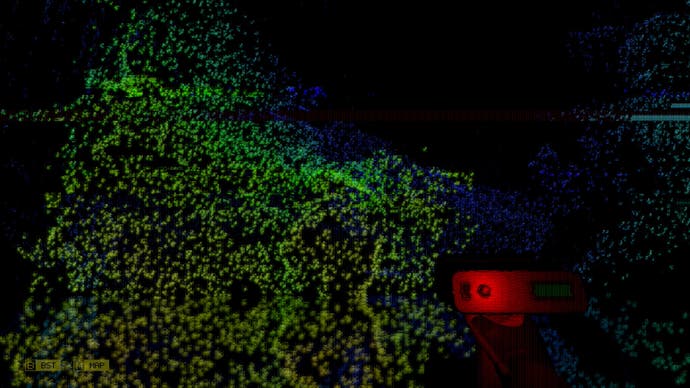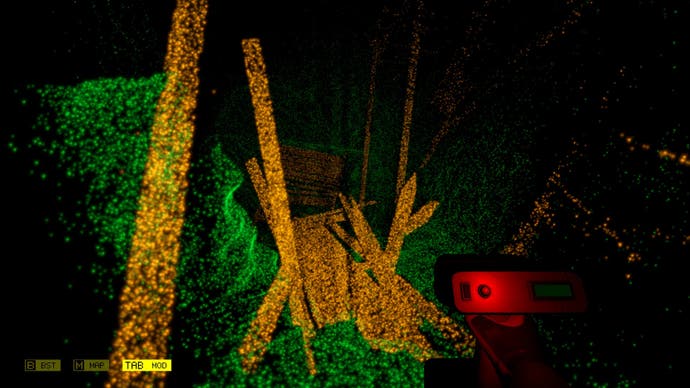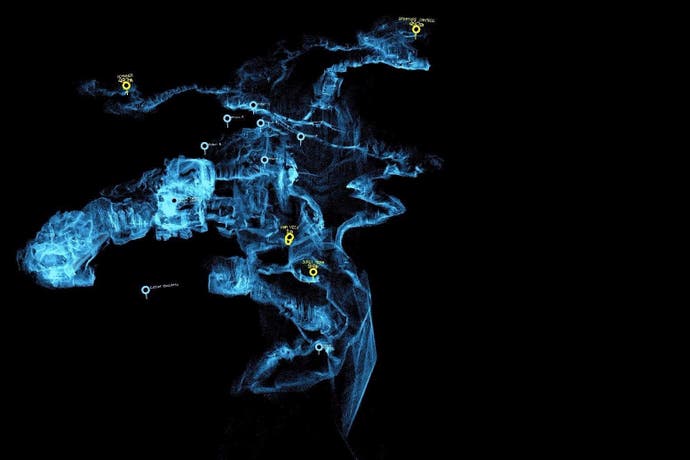Scanner Sombre review
Alone in the dark.
Introversion, the independent studio once styled as the last of the bedroom coders before bedroom coding became a thing all over again, doesn't tend to rush things. Prison Architect spent some three years in early access before finally crossing the line, and yet Scanner Sombre - remarkably only the studio's sixth title in its 16 year history - is out only a handful of days after being properly announced. A short, sharp experimental adventure built around one devastatingly clever central mechanic, it's a pointed antithesis to its systems-heavy predecessor.
Scanner Sombre feels every inch the Introversion game, though. It's got the same cold, detached beauty of older games like Uplink and DEFCON, and in its blunt minimalism it feels like a throwback to those earlier titles after the cartoon excesses of Prison Architect (a game whose coldness and commentary lay somewhat subversively beneath its surface). You're an unnamed, mute spelunker, navigating a series of caves that are rendered in total darkness as you work your way up to the surface.
Knowingly riffing off the likes of Dear Esther and Gone Home, Scanner Sombre is a 'walking simulator', if you must, but one that cleverly sidesteps much of the dreary debate about the genre by making a virtue of its own exploration. Your only tool is a LIDAR scanner, a device which covers the otherwise invisible scenery in a field of bright dots. To find your way in the dark you must paint each wall and crevice, filling in the void and creating your own abstract of the world around you.

It's a tactile mechanic that's slowly built upon through the game, the scanner itself a characterful machine that whirs, beeps and buzzes like some strange device you'd find amongst the rubble of a junk market or nestled alongside other arcane contraptions in the depths of an abandoned nuclear bunker. You control its aperture and simply spray in order to put Scanner Sombre's neon pointilism into effect, the results of your efforts etched permanently onto blind rock.
The scanner is responsible for some startlingly artful moments. The map that charts your adventure - a journey you can see in relief at all points in your journey - is achingly ethereal, a leaf skeleton of light points that pulls together into a wisp of blue smoke. There are singularly outstanding vistas, too; a dead lake that sits immune to your own scans, or the echoes of humanity in an otherwise abandoned cave.
As visually stirring as Scanner Sombre is - and it is capable of unparalleled beauty in its short run-time, made all the more powerful by the fact you've often painted its scenes yourself - it sounds spectacular too. From the analogue burbling of your LIDAR scanner to hollow subterranean drips and creeks, it's the perfect soundtrack to your solitude. Hand in hand with all that is the escalating sense of dread that underpins much of Scanner Sombre.

Shadows and suspense go hand in hand, after all, so it's somewhat inevitable that it makes a play for horror. The subtlety of the scares is impactful at first - the shadow of another being, or the shape of something else entirely fizzing into view via your own hand - but soon become disappointingly blunt, while a late play for a more homely kind of drama falls entirely flat. Over its three hours Scanner Sombre charts your ascent from strange depths to the slim signs of civilization nearer the surface, and I'm not sure if it's entirely by design that the more you stumble upon signs of humanity the more alien it all feels; that cold, detached feel that's often been Introversion's calling card comes apart a little when it's trying to tell a more intimate tale.
It makes for an interesting game that never quite builds to a satisfying conclusion. Scanner Sombre is about charting the unknown, then, or on a more personal level about fumbling through the dark as you slowly make sense of a very human tragedy. For all its artfulness and beauty, though, it's ultimately a game about how much fun it is colouring things in.
There's a slight disappointment that the tale it tells isn't as smart as the idea that powers it, a blot on an otherwise wonderful game. Scanner Sombre is a remarkable experiment, its only downfall being that once you've shed some light on your surroundings you realise there's not really that much to it at all.

